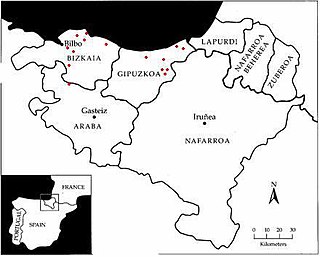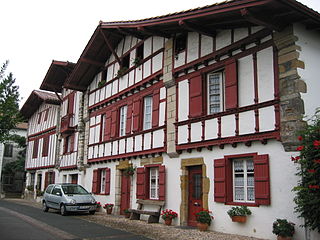Related Research Articles

The Ertzaintza is the autonomous police force for the Basque Country, largely replacing the Spanish Policía Nacional and Guardia Civil. An Ertzaintza member is called an ertzaina.
Spanish names are the traditional way of identifying, and the official way of registering, a person in Spain. They are composed of a given name and two surnames. Traditionally, the first surname is the father's first surname, and the second is the mother's first surname. Since 1999, the order of the surnames in a family in Spain is decided when registering the first child, but the traditional order is nearly universally chosen.
Jiménez is a patronymic surname of Iberian origin, first appearing in the Basque lands.
Salcedo or Salzedo and Saucedo is a Spanish toponymic surname, of a family proceeding from the Kings of León, of which a branch passed to Portugal. It is also used through marriage and female line by the only legitimate branch and representative of the Salazar family. It is also a possible derivative of the common surname Saucedo.
Mendoza is a Basque surname, also occurring as a place name.
Ribera is a Spanish word that translates into "the basin of a river", and may refer to:
Fernández is a Spanish patronymic surname meaning "son of Fernando" of Germanic origin. The Germanic name Ferdinand that it derives from means "brave traveler." The Portuguese version of this surname is Fernandes. The Arabized version is Ibn Faranda and it was used by the Mozarabs and Muwallads in Al-Andalus. Fernández was on the list of Officers and Sailors in the First Voyage of Columbus. The name is popular in Spanish speaking countries and former colonies. The Anglicization of this surname is Fernandez.
Juan Bautista Esquivel Lobo is a retired Costa Rican professional footballer who played his entire career for Saprissa.

Bengoetxea, Bengoechea or Bengoetchea is a Basque surname which is common all throughout the Basque Country, especially in cities such as: Murelaga, Lizarza, Alkitza, Aizarna, Aulestia, Igeldo, Oiartzun, Aia, Olaberria, Lazkano, Berrobi (Tolosa) and Zizurkil in Gipuzkoa; Valley of Orozko, Mungia, Zeberio, Mundaka and Galdakao in Biscay; and in Arrieta and Baranbio (Amurrio) in Alava.
Etxeberria (Basque pronunciation:[etʃeβeri.a], modern Basque spelling) is a Basque language placename and surname from the Basque Country in Spain and France, meaning 'the new house'. It shows one meaningful variant, Etxeberri (no Basque article –a, 'the'), and a number of later spelling variants produced in Spanish and other languages. Etxebarri(a) is a western Basque dialectal variant, with the same etymology. Etxarri (Echarri) is attested as stemming from Etxaberri.

Basque surnames are surnames with Basque-language origins or a long, identifiable tradition in the Basque Country. They can be divided into two main types, patronymic and non-patronymic.
Ugalde is a Basque surname, the word meaning water-side or river. Notable people with the surname include:
Esquivel is a surname of Basque origin. Esquivel may also refer to:
Mora is a Spanish surname.
Mena is a Spanish surname that originates as both a Basque and Spanish Sephardic surname.
Ibarra is a Basque-language surname meaning "valley" or "plain by the river". Notable people with the surname include:

In the Spanish public discourse the territory traditionally inhabited by the Basques was assigned a variety of names across the centuries. Terms used might have been almost identical, with hardly noticeable difference in content and connotation, or they could have varied enormously, also when consciously used one against another. The names used demonstrate changing perceptions of the area and until today the nomenclature employed could be battleground between partisans of different options.
The surname Chasco or Txasko is a Basque surname that has its traditional roots in Los Arcos, although it has branches in Navarre itself and in Álava.
Juan Bautista is Spanish for John the Baptist. It is a Spanish given name. It may refer to:

The Erbi Txakurra is a Spanish breed of scenthound. It originates in the provinces of Álava and Bizkaia in the Basque Autonomous Community in northern Spain. It is one of five Basque breeds of dog, the others being the Basque Shepherd Dog, the Pachón de Vitoria, the Villano de Las Encartaciones and the Villanuco de Las Encartaciones, and is one of fourteen animal breeds native to the Paîs Vasco. It was traditionally used for hunting hare, but since the hare became scarce in the Basque country it is more frequently used to hunt wild boar, roe deer or occasionally foxes.
References
- ↑ "Eskerrik asko Ezkibel". Blas Uberuaga. 23 April 2009. Retrieved 24 May 2009.
- ↑ "Significado del Apellido Esquivel". Portal de Euskadi. Retrieved 24 May 2009.